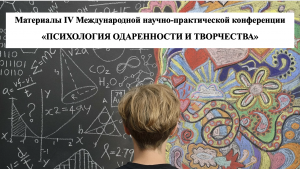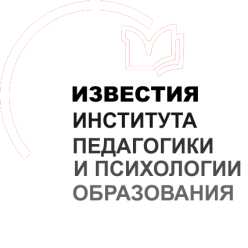 Ситаров В. А., доктор педагогических наук, профессор, ГАОУ ВО МГПУ, Москва,
Ситаров В. А., доктор педагогических наук, профессор, ГАОУ ВО МГПУ, Москва,
E—mail: sitarov@mail.ru
Маралова Т. П., кандидат психологических наук, доцент, Череповецкий государственный университет, Череповец,
E—mail: tmaralova@inbox.ru
Актуальность проблемы обусловлена значимостью изучения факторов, обусловливающих развитие творческих способностей детей на различных этапах возрастного развития. Цель исследования состояла в выявлении влияния вовлеченности родителей в образовательный процесс на развитие творческих способностей детей младшего школьного возраста. В эмпирическом исследовании приняло участие 66 младших школьников 8-9 лет и 66 родителей (матерей). В результате по уровню вовлеченности в образовательный процесс было выделено три типа родителей: с высокой вовлеченностью (тип родителей «Наставники»), с умеренной вовлеченностью («Либералы») и с низкой вовлеченностью («Невидимки»). Установлено, что наиболее благоприятным для развития творческих способностей детей является тип родителей с умеренной вовлеченностью в образовательный процесс («Либералы»), а неблагоприятным – тип родителей с низкой вовлеченностью в образование («Невидимки»). Полученные результаты могут быть использованы в практике работы школ в процессе выстраивания оптимальных отношений учителя с родителями.
The relevance of the problem is due to the importance of studying the factors that determine the development of creative abilities of children at various stages of their development. The aim of the study was to identify the influence of parents’ involvement in the educational process on the development of creative abilities of primary school children. The empirical study involved 66 primary school students 8-9 years old and 66 parents (mothers). As a result, according to the level of involvement in the educational process, three types of parents were identified: with high involvement (the type being «Mentors»), with moderate involvement («Liberals») and with low involvement («Invisible»). It is established that the most favorable for the development of children’s creative abilities is the type of parents with moderate involvement in the educational process («Liberals»), and unfavorable — the type of parents with low involvement in education («Invisible»). The results obtained can be used in the practice of schooling process and in the process of building optimal teacher-parent relationships. Читать далее Ситаров В. А., Маралова Т. П. | ВЛИЯНИЕ ВОВЛЕЧЕННОСТИ РОДИТЕЛЕЙ В ОБРАЗОВАТЕЛЬНЫЙ ПРОЦЕСС НА РАЗВИТИЕ ТВОРЧЕСКИХ СПОСОБНОСТЕЙ ДЕТЕЙ МЛАДШЕГО ШКОЛЬНОГО ВОЗРАСТА
